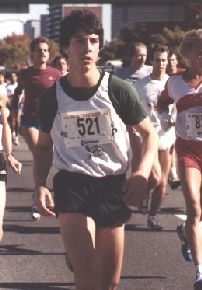Famous First Marathons
John Elliott
Jan 28, 2000
COPY LINK
From famous ultramarathoners to the founders of the running revolution, to the ordinary man or woman on the street, everyone who has run a marathon has a story about their first. In her book, “First Marathons”, Gail Kislevitz brings together interviews and first marathon stories from dozens of famous marathoners.
By permission of the publisher, we were able to include a few chapters from Gail Kislevitz’s book – take a look and enjoy:
Find this book and more at Breakaway Books – run by a way cool guy and another great runner: Garth Battista!
From the Editor

Every marathoner has their first marathon story. If they’ve run a lot, they might forget the details of other races, but the first marathon lives in their mind – each and every mile. And most find that marathoning is like eating a bag of potato chips – it’s nearly impossible to stop after just one.
In this area of MarathonGuide.com, you can read my first marathon story, read the stories of famous runners (above) or Marathon Stories That Inspire. You can also contribute your own story as we ask you to make an effort to become part of the marathoning and MarathonGuide.com worldwide community. Please contribute to this website in whatever way you can (your stories, your posts, your comments, your efforts), contribute your time or efforts to your local marathon and/or local running club, get involved.
And, most importantly, remember what got you running in the first place and use the marathon to keep you inspired and to become an inspiration to others.
– John Elliott
COPY LINK
You are free to use this material for non-commercial purposes. This means you can read it, share it with others, and use it in your own personal projects. For more information on the rules for using this material, please read the following documents:
Creative Commons LicenseAll rights reserved. Copyright © 2025 Marathon Guide